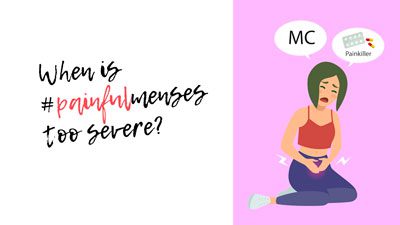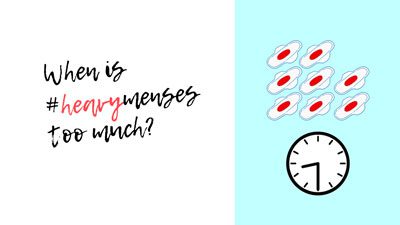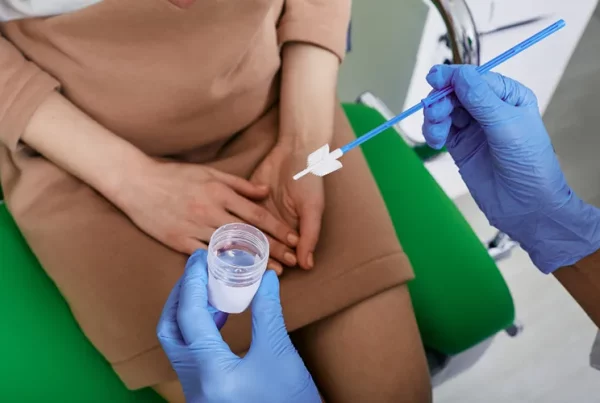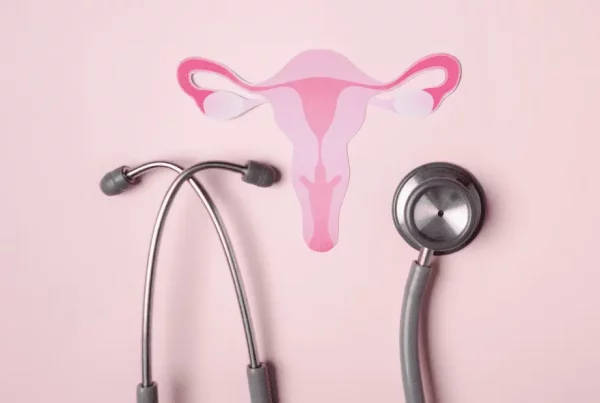Menses is often a dread for many ladies as the time of the month draws near. However, for some, period problems tend to be a lot more severe. Some ladies might get prolonged menses beyond 7 days or experience bleeding so heavy that it affects their daily lives. Others experience cramps so bad that even painkillers don’t help.
What causes these period problems? In this section, Dr Kanika explains the common causes:
1. Painful Menses
Many ladies often get painful cramps during their menses. This is commonly referred to as dysmenorrhea or simply period pains. There are 2 main types of dysmenorrhea:
a. Primary Dysmenorrhea
This usually happens to teenagers and unmarried ladies. They will experience pain on the first day of their menses or 1-2 days before the start of their menses. Panadol is generally sufficient to manage the pain. After childbirth, this type of period pain goes away.
b. Secondary Dysmenorrhea
This is a more serious symptom. It typically happens to ladies over the age of 30. The pain tends to start on Day 2 or Day 3 of menses and lasts throughout the menses. This is also a common symptom for ladies suffering from endometriosis.
2. Heavy Menses
While heavy periods don’t cause pain, they can affect the quality of life by limiting social activity or cause social embarrassments. Clinically, repeated heavy periods can also result in anemia (low blood count), which might cause tiredness and in more serious cases, require a blood transfusion.
Here are 3 of the most common causes of heavy menses:
a. Fibroids
Fibroids can result in heavy bleeding. They often occur in ladies over the age of 30.
b. Dysfunctional Uterine Bleeding
In dysfunctional uterine bleeding, there is no tumour or lesion in the womb. In this case, the gynae does not find any specific cause for heavy bleeding.
However, it requires treatment to reduce the heavy bleeding. Otherwise, the haemoglobin level may drop from 12-14 (normal level) to 7-8.
c. Adenomyosis
In this condition, the lady experiences a lot of pain in addition to heavy bleeding during menses. Ladies over the age of 35 and ladies with no children are more prone to this condition.
3. Spotting between Menses
Spotting can happen either before or after menstruation.
a. Ovulation Bleed (Mid-cycle Bleed)
A lot of women will get a little bit of spotting around 10-14 days after their period, where ovulation happens.This is normal and ladies do not have to be worried about this.
However there is another common reason for spotting in between cycles which is a cause for concern.
b. Polycystic Ovarian Syndrome (PCOS)
In PCOS, there is an imbalance in hormone levels, which results in ovulation not happening on a monthly basis. This condition can also result in spotting, or not having regular menstruation.
When to See a Gynae for Period Problems?
While most of the time these symptoms are not a huge cause for concern, there are some signs ladies should not ignore. In this section, Dr Kanika shares with us when ladies should seek a gynae’s help for these common period problems.
1. Painful Menses
Ladies in Singapore have high tolerance when it comes to period pain. However, you should definitely see a gynae if you experience pain so bad:
- You have to take an MC from school or work.
- You are unable to participate in daily activities.
- You find yourself taking increasing doses of painkillers.
Another major red flag would be if a lady does not usually get pain during menses but after giving birth, she starts having painful periods.
2. Heavy Menses
Some ladies may have very heavy flow but they do not realise it, as they have gotten used to it. While heavy menses can often be subjective, there are a couple of ways for ladies to quantify what is considered as heavy menses:
- If you need to change your pad/tampon every 1 or 2 hours.
- If you notice that you bleed out of your pad/tampon overnight when sleeping.
If you think you’re experiencing heavy menstrual flow, it is good to see a gynae as they would do a blood test to look at your haemoglobin levels. This will help the gynae assess how heavy your flow actually is as ladies with a very heavy flow generally would be anemic (low blood count).
3. Spotting between Menses
If you constantly find that you get spotting for 3-4 days after your period is over, you might have a polyp in your cervix. This can be easily detected by the gynae during a check-up.
4. Irregular Menses
If your period doesn’t come for 2-3 months, it is usually a cause for concern. However, if it happens to you for the first time, it can be due to stress or sudden weight gain. Dr Kanika advises you to track your cycle for about 3 months first.
If you still do not get your period regularly, you should see a gynae as the underlying cause could be hormone imbalance. Hence, it is important to see a gynae as this imbalance may also affect your fertility and ability to conceive. Usually, the gynae will do some blood tests, an ultrasound scan and then advise you accordingly.
Now that you know when you need to seek help from a gynae, don’t let your work hours be an excuse to prevent you from seeing a doctor. Since 1 June 2019, Dr Kanika’s clinic has one more evening clinic session on Fridays till 8.30pm. Her other evening clinics are on Mondays and Wednesdays till 9pm, so that you can come by after work or dinner.









